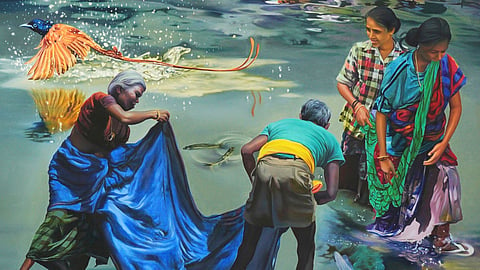
- HOMEGROWN WORLD
- #HGCREATORS
- #HGEXPLORE
- #HGVOICES
- #HGSHOP
- CAREERS
- ABOUT US
- CONTACT US

The Hindi phrase 'aam aadmi' can be translated to mean both 'the common man' — as in the average Joe or common folk — and the absurdist wordplay 'mango man'. This secondary, satirical translation of the phrase, which has become emblematic of the middle class in Indian political discourse, is the premise of 'Mango Man' — an exhibition of seven Indian artists curated by the Paris-based curatorial trio TAK Contemporary.
Within the context of Indian society, the definition of 'aam aadmi' derives from socio-economic identities such as class, caste, religion, language, gender, and region. Representing the middle and lower strata of society, they are often preoccupied with everyday necessities, have unequal access to infrastructure and opportunities, and endure systemic discrimination.
Showcasing a selection of paintings, sculptures, prints, mixed media pieces, and two large-scale installations by Salik Ansari, K.G. Babu, Satyanarayana Gavara, Sudhakar Chippa, Rajyashri Goody, Pavan Kavitkar, and Sumakshi Singh, the exhibition questions the socio-political norms of Indian society through the critical lens of food politics, caste discrimination, urban-rural migration, and the human-nature conflict and its impact on personal and social memories.
In Threads of Sustenance, Thrissur-based self-taught artist K.G. Babu depicts the fishing practices of the Adivasi community in Attappadi, located in the Western Ghats of Kerala, India. Here, fishing serves as a means of sustenance — and by extension survival — rather than trade, sourced from the surrounding natural environment with conscious choices for long-term preservation and a commitment to avoiding over-exploitation. This approach reflects the community's keen understanding of natural resources and their commitment towards maintaining ecological balance — a stark contrast to the excess-driven pursuits of endless consumption championed by contemporary capitalist cultures.
At the other end of the broad spectrum, Rajyashri Goody’s creative practice focuses on food and water politics, caste and religion, literacy and literature.
Incorporating various media — such as text, voice, paper pulp, ceramics, photography, printmaking, videos, and installations — in her practice, Goody aims to create space and time for thinking through everyday instances of caste-based violence and Dalit resistance, and how elements like food, nature, and language are actively used as tools to enforce caste rules for generations.
Through these multi-faceted explorations of the lived realities of the 'aam aadmi' — the commons — and the social, political, and economical fluctuations they are subjected to, the group exhibition provides a critical examination of Indian society, offering personal reflections and collective narratives through a range of artistic practices.
'Mango Man', curated by TAK Contemporary, opens on February 1, 2025, at 193 Gallery, Paris. Learn more about the exhibition here.
If you enjoyed reading this, here's more from Homegrown:
'Brain Rot' Is Indian Artist Viraj Khanna’s Scathing Take On Our Digital Decay
Absent Findings' Debut Collection Is A Modern Love Letter To South Asian Craft
Flower Of Fire: The Life And Legacy Of Bengali Artist Gopal Ghosh
